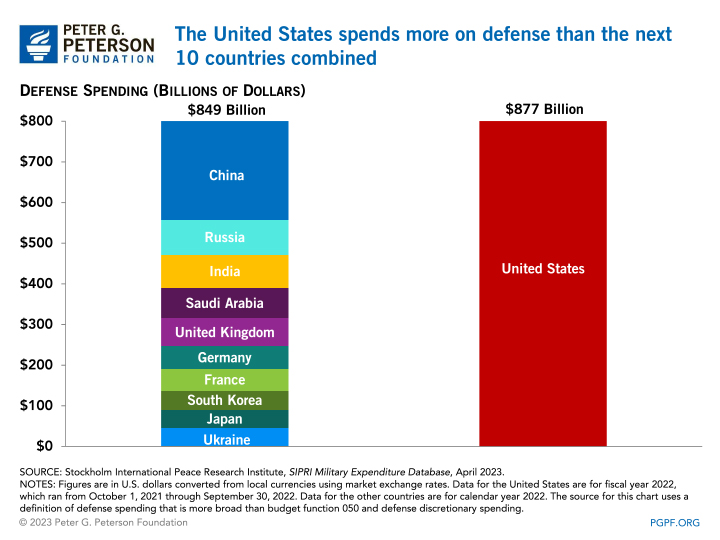Eisenhower famously warned us about the dangers of tying our nation's industry to building military tools.
A vital element in keeping the peace is our military establishment. Our arms must be might, ready for instant action, so that no potential aggressor may be tempted to risk his own destruction. . . . American makers of plowshares could, with time and as required, make swords as well. But now we can no longer risk emergency improvisation of national defense; we have been compelled to create a permanent armaments industry of vast proportions. . . . This conjunction of an immense military establishment and a large arms industry is new in the American experience. . . .Yet we must not fail to comprehend its grave implications. . . . In the councils of government, we must guard against the acquisition of unwarranted influence, whether sought or unsought, by the military-industrial complex. The potential for the disastrous rise of misplaced power exists and will persist.
Largely, we didn't listen.
US military spending is VAST: the US spends more on "defense" than the next 10 countries combined as of 2022 (previously it was more than the next 9) (source). Of those 10 countries, 3 are allies (UK, Germany, France).

The Problem
Now we have a problem: everyone needs a job (see Productivity, Universal Basic Income, Bullshit Jobs, and more), and a lot of those jobs are for defense contractors.
So if we cut down on spending, we're necessarily leading to cuts in jobs. This means layoffs for companies like Raytheon, Boeing, Lockheed Martin, Northrop Grumman, and more. Not just the defense contractors, but their subcontractors as well.
On a personal note, I used to work for what is now Collins Aerospace, and personally saw the effects of layoffs whenever the defense budget was threatened.
In short the problem is this: if you cut military spending, you cut jobs.
So what can we do? Short of implementing UBI, I only see one solution: the wean.
The Wean
The US takes a play from Schindler's List. Specifically, we pay munitions manufacturers to note manufacture munitions.
We already pay farmers not to plant crops (see Is Ethanol Worse Than Gas (the corn thread)). So what we do is this: get an honest estimate from each company of how much they pay employees and American-based subcontractors.
Then, the government continues to pay for the contract less any overseas fees, on the condition that the contractor does not lay off any of the employees. They do this for some period of time, say 3 years. During that period of time, the company is not allowed to lay off employees, but can continue getting paid while they pivot to a different field.
Example
Suppose Raytheon charges the government $100 for a part.
$40 of that goes to paying salaries, $30 of it goes to a US contractor, $15 of it goes to building the part, and $5 of it goes to an overseas subcontractor. The remaining $10 is profit.
The government tells Raytheon: You no longer need to deliver that part, but find out how much your American subcontractor actually costs. Suppose the subcontractor makes the part for $20 and keeps the other $10 as profit.
The government tells Raytheon: Here is $60. Use $40 of it for salaries, keep $10 as profit, and give $10 to your American subcontractor as profit.
This has the added benefit of reducing overseas (Chinese) dependencies, something Mitt Romney wanted to do overnight in 2012.
Now there's a glaring flaw in this idealistic plan: it requires contractors to be honest about their margins and pricing, in a way they may find detrimental. I think this can be partially mitigated by throwing around the threat of an audit, but there's likely something else I'm missing here.
The End Goal
Really, we're offering these companies Slack. At the end of the period (3 year, 5 year what have you), they will have pivoted to a new product or gone bankrupt. The taxpayer is paying NOT to produce weapons (which is necessarily cheaper than producing weapons; it's the same costs minus the actual weapon), and giving these companies a stress-free period to pivot to some other need.
Then we can decouple building bombs from employing people. At least until we find some other way to pay people.
See Also
We are not the World's Police force
Productivity
Universal Basic Income
Bullshit Jobs